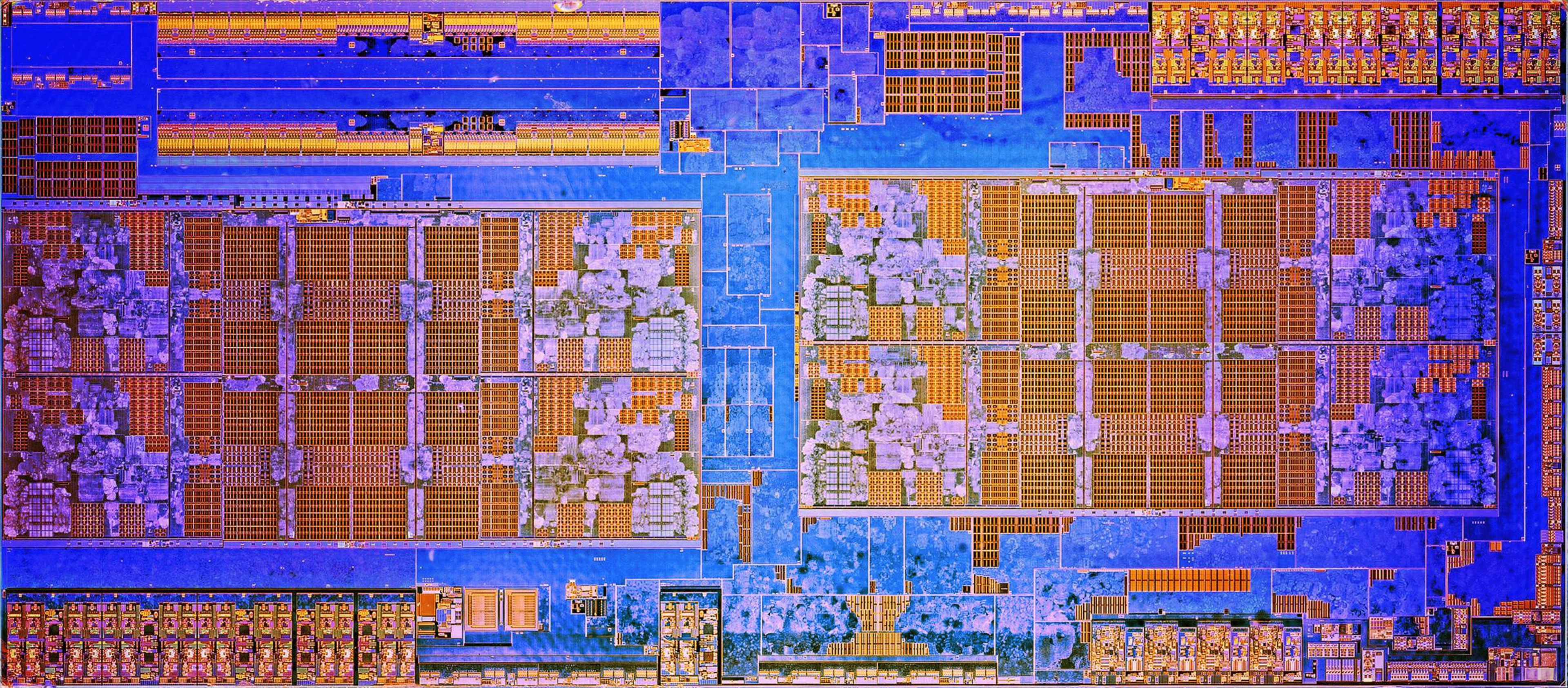Live benchmarks: AMD Ryzen vs. Intel Core
Ryzen 7 takes on Core i7 in multiple live benchmarks.


Ryzen is up against the best PC gaming processors.
Earlier today, AMD took the wraps off their Ryzen 7 line of CPUs, giving us specifications, pricing, and a sneak peek at performance. All of the benchmarks are running on similarly equipped PCs, with AMD pitting Ryzen 1800X against Intel's Core i7-6900K, the 1700X going up against the i7-6800K, and the 1700 taking on the i7-7700K. AMD wins on pricing in all of these matchups, but what about performance? I've got five (rather shaky at times—sorry!) videos showing live benchmarks (or at least performance comparisons) of the two competitors.
Before we get to the videos, keep in mind that this is an AMD staged event. They picked the CPUs, graphics cards, software, and settings for each test. I have no reason to suspect they're intentionally handicapping Intel, but that doesn't mean the tests used unbiased software. Obviously AMD wants to win any benchmarks being shown right now, and the official launch date (and embargo time for independent benchmarks) is March 2. Pre-orders are available for Ryzen already, and it definitely shows promise, but you'll want to wait for the full review and analysis before taking the plunge. And with that out of the way, here are the videos.
Starting off with a bang is Battlefield 1, running at 4K with dual Titan X (Pascal) cards in SLI. This is a monstrously powerful graphics setup, and even though 4K might push the bottleneck more toward the GPU, there's still a minor difference in performance. AMD's Ryzen 7 1800X takes on Intel's i7-6800K in this test. That's a bit odd as most of the time AMD was putting the 1800X against the 6900K, suggesting perhaps they're fudging things a bit.
Intel's part is a 6-core chip that costs $440 or so, going up against the future $499 Ryzen part, which of course has two additional cores and slightly higher clocks. The net result is that, at least in the scenario shown, AMD's Ryzen is able to keep up with Intel's entry level Broadwell-E, and even surpass it slightly.
Next is Sniper Elite 4, this time with RX 480 cards in CrossFire. The CPUs are AMD's Ryzen 7 1800X against Intel's i7-6900K. AMD's drivers do tend to have more overhead in CrossFire configurations, though dual RX 480s can outperform a single GTX 1080, so these are definitely potent gaming rigs. As before, Ryzen comes out ahead of Intel, in this ad-hoc benchmark.
One of the questions that we definitely need to ask is why the benchmarks are running at 4K. For CPU testing purposes, 4K is a bad choice because it pushes the bottleneck to the GPUs more than the CPU. That AMD is competitive in these two gaming tests is good news, but are they actually faster in a larger selection of games? We'll find out come March 2. Practically speaking, I don't expect most games to scale particularly well going from 4-core to 8-core, but DX12 titles do tend to be make better use of multi-core than DX11 games.
The final gaming benchmarks pits the 'entry level' Ryzen 7 1700 against Intel's i7-7700K Kaby Lake part. Most people will say that i7-7700K is more than sufficient for any gaming scenarios, including streaming, but here AMD is using OBS broadcasting to Twitch, with Dota 2 running in the background. The OBS encoding is set to use the CPU, with the x264 codec and a 3500kbps bitrate—a common setting for popular streamers, according to AMD, as the CPU tends to have higher quality at lower bitrates compared to fixed function encoding like Intel's Quick Sync, Nvidia's NVENC, or AMD's VCE.
Keep up to date with the most important stories and the best deals, as picked by the PC Gamer team.
The video is a bit shaky (sorry!), but in person it was very obvious that frames were being dropped on the Intel system while the AMD system performed as expected—the laptops in front of each system are showing the resulting Twitch stream, and in the lower-right corner of each you can clearly see some choppiness on the Intel side.
Is this a fair comparison? Perhaps not, as I think many streamers are fine with using GPU encoding, but if you want maximum quality then using the CPU with the x264 codec is the better solution. Many professional streamers will even have a second system doing the stream encoding, just to keep framerates smooth, but a 6-core/12-thread processor (or 8-core/16-thread) is generally able to handle all the game logic and calculations along with the video encoding without dropping frames.
Moving away from gaming tests, the next video has AMD's Ryzen 7 1700X going against the i7-6800K in a 'mega-tasking' benchmark. There are three CPU-heavy workloads running concurrently. First is Blender, doing the same 3D rendering of the Ryzen CPU that we've seen in the past. Next is HandBrake, doing a video encode—I didn't catch the exact settings, but it's another test AMD has used before. Finally, the Optane 2.0 benchmark is running in Google's Chrome browser. Don't get distracted by the Optane score that eventually shows up near the end of the benchmark, as it's only one element of the test. The real purpose is to show the overall time to completion, with the understanding that certain professional workloads could take multiple hours to run. Here, AMD's 1700X (I mistakenly quote the price as $499, but it's actually $399) completes all three tasks in 92.0 seconds while the i7-6800K takes 112.3 seconds.
Last we have an Excel benchmark. There's sometimes a feeling that Excel and office workloads don't really need a faster CPU, but for complex spreadsheets that's not at all true. This test uses a macro script to generate a whole bunch of different charts, timing the entire process, and AMD has their entry-level Ryzen 7 1700 against Intel's i7-7700K. If the test doesn't scale well with CPU cores, Intel would have a distinct clockspeed advantage, but then AMD wouldn't be using this benchmark if that were the case. The result is that the 1700 finishes in 23 seconds, compared to 27 seconds on the 7700K.
Not surprisingly, then, AMD had five different benchmarks to show Ryzen performance, and in all five cases their CPU outperforms the Intel 'equivalent'—often at a lower price. That's great news, but remember that these are all AMD curated benchmarks, so we still need independent testing to confirm the results. I suspect there will be cases where AMD doesn't win the performance battle, but compared to their previous APUs and the Vishera line of FX-series processors, Ryzen is a huge jump in performance.

AMD set a target for Ryzen of improving IPC (Instructions Per Clock) by 40 percent. According to AMD, it beat that mark with average IPC improvements of 52 percent (and sometimes more). Even if Ryzen can't win every round of fighting with Intel, at least there are many widely used benchmarks that show AMD delivering competitive performance, both at lower prices and lower power use. That's something we haven't heard from AMD in a long time. Check back on March 2 for the full review of AMD's new Ryzen parts.
Jarred's love of computers dates back to the dark ages when his dad brought home a DOS 2.3 PC and he left his C-64 behind. He eventually built his first custom PC in 1990 with a 286 12MHz, only to discover it was already woefully outdated when Wing Commander was released a few months later. He holds a BS in Computer Science from Brigham Young University and has been working as a tech journalist since 2004, writing for AnandTech, Maximum PC, and PC Gamer. From the first S3 Virge '3D decelerators' to today's GPUs, Jarred keeps up with all the latest graphics trends and is the one to ask about game performance.







